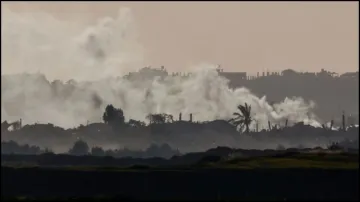US revises language in UN draft resolution, calls for 'immediate ceasefire' of six weeks in Gaza
The initial draft of the US resolution supported a "temporary ceasefire" in the nearly five-month-long Israel-Hamas war. US Vice President Kamala Harris bluntly called out Israel for not doing enough to ease the humanitarian catastrophe in Gaza and demanded Hamas to agree to a six-week ceasefire.

New York: After facing intense global pressure, the United States on Tuesday revised language in a draft UN Security Council resolution to back an "immediate ceasefire" of roughly six weeks in the war-torn Gaza together with the release of all hostages. This came after US Vice President Kamala Harris demanded Palestinian militant group Hamas to agree to an immediate six-week ceasefire while urging Israel to do more to boost aid deliveries in the enclave.
The third revision of the text was first proposed by the US two weeks ago, as the initial draft had shown support for a "temporary ceasefire" in the nearly five-month-long Israel-Hamas war. The US had vetoed three draft resolutions at the UN that have aimed for an immediate ceasefire in the conflict that has killed more than 30,000 Palestinians and left over 80 per cent of Gaza's population homeless.
The US has sought any Security Council support for a ceasefire to be linked to the release of hostages held by Hamas in Gaza, after being averse to the word 'ceasefire'. Hamas attacked Israel on October 7, killing 1,200 people and taking 253 hostages, according to Israeli tallies. It has justified its veto by saying that such council action could jeopardise efforts by the US, Egypt and Qatar to broker a pause in the war and the release of hostages.
US President Joe Biden said on Tuesday it was in the hands of Hamas whether to accept a deal for a ceasefire as delegations held a third day of talks with no sign of a breakthrough. Washington has traditionally shielded Israel at the UN, but has also abstained twice, allowing the council to adopt resolutions to boost aid to Gaza and called for extended pauses in fighting.
Meanwhile, an Israeli airstrike killed at least 17 people in the southern Gaza city of Khan Younis on Tuesday, Palestinian officials said, as talks on a cease-fire between Israel and Hamas ended without a breakthrough. The latest fatalities brought the overall Palestinian toll from the nearly five-month war to 30,631, according to Gaza's Health Ministry.
What did Kamala Harris say?
On Sunday, Harris made some of the strongest comments by a senior leader of the US government till date, pressuring the Israeli government and underlining specific ways on how more humanitarian aid can be provided to the crowded Palestinian enclave where hundreds of thousands of people are facing famine following Israel's devastating campaign. Harris said innocent people were suffering a "humanitarian catastrophe".
The Vice President bluntly called out Israel for not doing enough to ease the catastrophe in Gaza and called for an immediate ceasefire in Gaza and urged Hamas to accept a deal to release hostages in return for a 6-week cessation of hostilities. Her remarks came as a Hamas delegation arrived in Egypt for the latest round of ceasefire talks, billed by many as the final possible hurdle for a truce,
"People in Gaza are starving. The conditions are inhumane and our common humanity compels us to act...The Israeli government must do more to significantly increase the flow of aid. No excuses," Harris said.
Harris' remarks reflected intense frustration, if not desperation, within the U.S. government about the war, which has hurt Biden with left-leaning voters as he seeks re-election this year. Harris said Israel must open new border crossings, not impose "unnecessary restrictions" on aid delivery, protect humanitarian personnel and convoys from becoming targets, and work to restore basic services and promote order so that "more food, water and fuel can reach those in need."
US aid in Gaza
An agreement would bring the first extended truce of the war, which has raged for five months so far with just a week-long pause in November. Dozens of hostages held by Hamas militants would be freed in return for hundreds of Palestinian detainees. The White House on Monday said a temporary ceasefire in Gaza was essential to a hostage deal and called on Hamas to accept the terms currently on the table.
Meanwhile, the US carried out its first humanitarian airdrop in Gaza on Saturday as aid agencies warned of a growing humanitarian disaster in the Palestinian enclave in the absence of a ceasefire deal. Three C-130 US military planes delivered more than 38,000 meals into a territory where the UN says at least 576,000 people are one step away from famine conditions.
Washington carried out another airdrop on Tuesday, parachuting in more than 36,800 meals. US Defense Secretary Lloyd Austin met at the Pentagon on Tuesday with Benny Gantz, a member of Israel's war cabinet, and urged his support for Israel to do more to help civilians.
The State Department's spokesperson, Matt Miller, called the humanitarian situation in Gaza "horrific". Aid supplies to the rest of Gaza, already sharply curtailed since the start of the war, have dwindled to barely a trickle over the past month. Whole swathes of the territory are completely cut off from food.
The White House has said the airdrops would be a sustained effort, and that Israel supports them. Critics say airdrops are far less effective than aid deliveries by truck, and it is nearly impossible to ensure supplies do not end up with militants. "Israel welcomes the humanitarian airdrops by the US, which were discussed and coordinated with us," said an Israeli official in Washington.
(with inputs from Reuters)
ALSO READ | 'Relocate to safe areas within Israel': India issues advisory after Kerala man killed in Israel-Hamas War